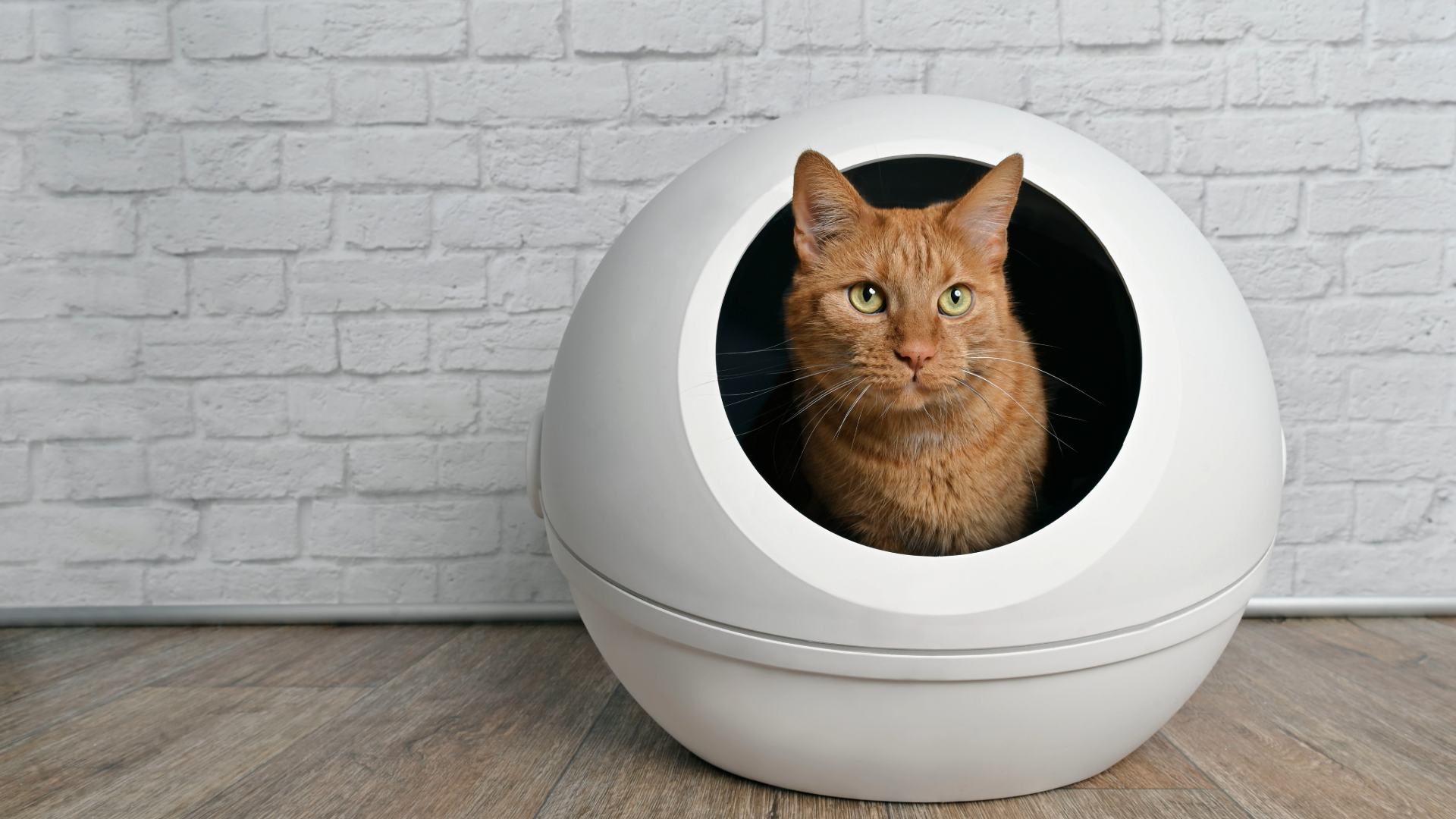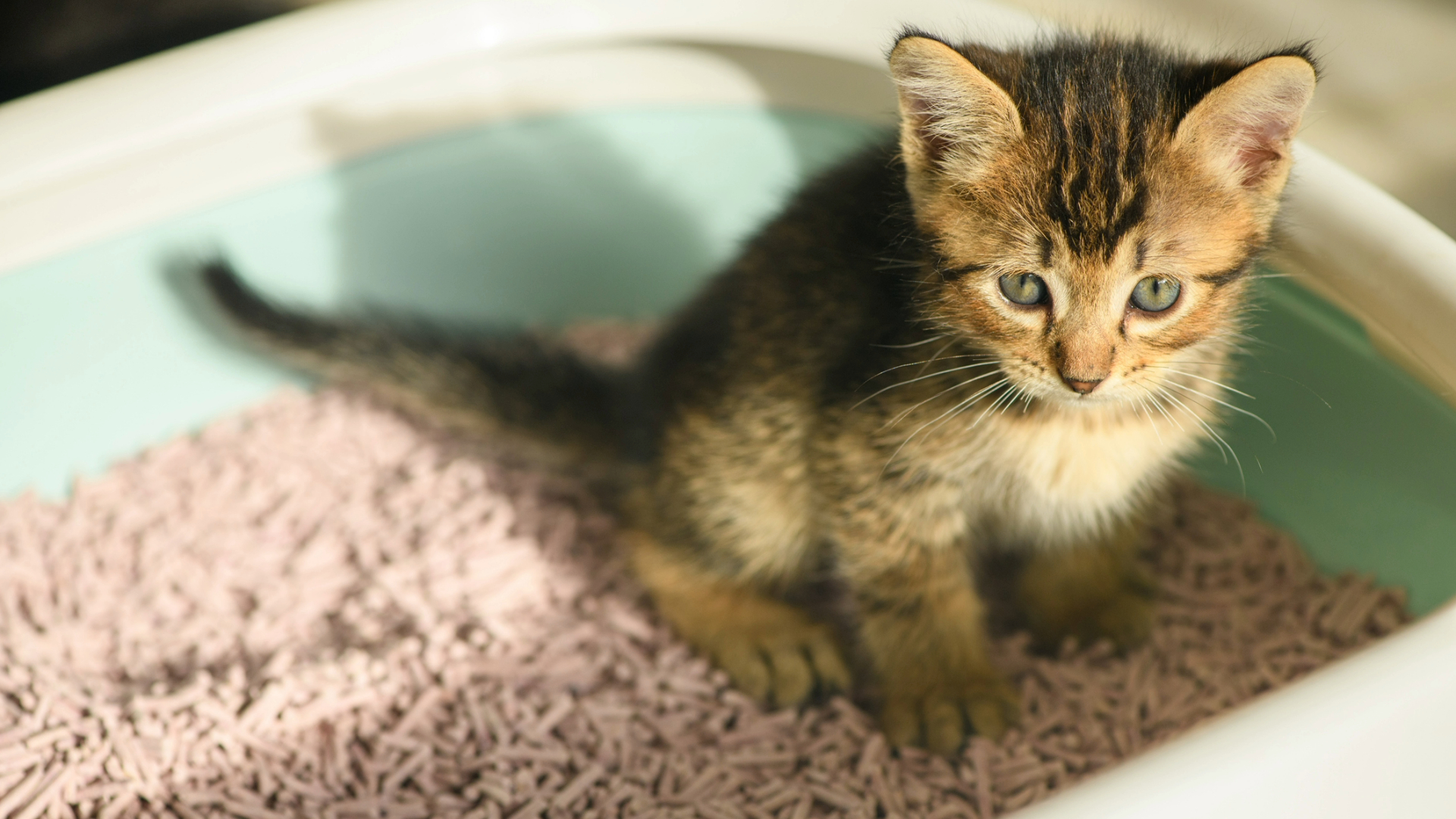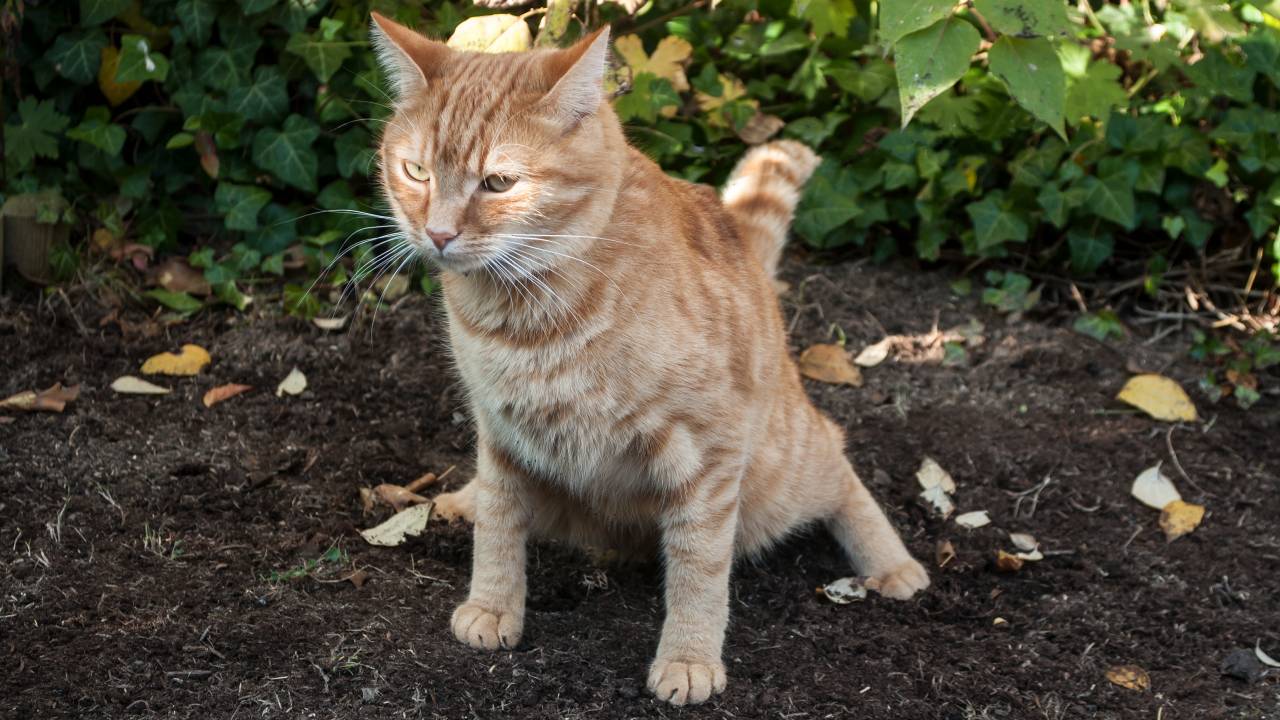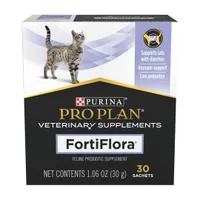Blood in cat stool: vet’s guide to signs, causes, and treatment
Have you found blood in your cat’s stool? Our expert is here to help

Get the best advice, tips and top tech for your beloved Pets
You are now subscribed
Your newsletter sign-up was successful
There are many reasons why you might find blood in your cat’s stool, including cancer, pancreatitis, worms, and constipation. As this could indicate a serious health condition, it’s always recommended to seek advice from your vet – no matter how much blood is present.
The color, consistency, and quantity can vary, and you might also notice other symptoms, such as your cat not eating, losing weight, or having accidents outside the litter box. However, sometimes this may be the only sign you notice, making it tricky to pinpoint the cause.
To help you understand what might be going on, Dr. Rebecca MacMillan has explained eight potential causes of blood in a cat’s stool, the symptoms to watch for, and how it can be treated. She’s a qualified vet with over 16 years of experience and has extensive knowledge of feline health issues like this. Here’s what you need to know.
Signs of blood in cat's stool
Blood in cat's stools can vary from the odd small red or pink streak to full-blown red, bloody stools. Less commonly, you may see something called melaena, which is digested blood. This causes feces to take on a black sticky, tar-like appearance due to a bleed higher up in the digestive tract (eg. a stomach ulcer or tumor).
Sometimes, blood in the stools can be associated with other signs. These may include:
- A change in stool consistency, either looser feces than normal or they might be harder and drier if your cat is constipated
- Increased mucous in the feces
- Feces with an increased unpleasant odor
- Passing stools outside of the litter tray or having accidents in the house (here’s how you can stop cats pooping outside the litter tray)
- Changes in appetite
- Cat throwing up
- Cat losing weight
- Abdominal discomfort
Causes of blood in cat's stool
Many things could cause your cat to have blood in his stools. This is why it is important to get your pet checked out by your vet so that they can help diagnose what the underlying issue might be.
Here is a list of possible reasons why your cat might have blood in his poo:
Get the best advice, tips and top tech for your beloved Pets
- A sudden change in diet: A new diet or brand could affect your cat’s stomach (here’s some expert advice on changing cat food)’
- Dietary indiscretion: Eating something he shouldn’t or going off food
- Infectious disease: Viruses, bacterial infections, and parasites (such as worms or protozoa) can cause loose stools which may be bloody
- A dietary sensitivity: If your cat has a sensitive stomach then certain ingredients may trigger inflammation leading to bloody, loose stools
- Inflammatory bowel disease: (IBD in cats) inflammation in the digestive tract
- Pancreatitis: Inflammation of a small organ called the pancreas could lead to diarrhea in cats as well as other symptoms, such as lack of appetite or vomiting
- Underlying health issues: Thyroid problems or cancer could cause loose stools, with or without blood
- Constipation: Straining to pass stools could cause bleeding to occur. There are several reasons why your cat might have constipation, including dehydration, injury, muscle weakness, or a physical obstruction

What to do if you notice blood in your cat's stool
If you see blood in your cat’s stools then you should get your pet checked out by your vet. It could be something mild, such as eating something that has disagreed with them, but it could be something more sinister.
If your cat is vomiting, off his food, or showing signs of pain (such as a tense face, a hunched-up abdomen, or hissing at you), it’s especially important to get your pet seen quickly. The more promptly you seek help, the quicker and more effectively the problem can be dealt with.
How to treat bloody stools in cats
If your cat is only experiencing a mild self-limiting bout of tummy upset and is otherwise well, then you could try some bland food for a few days (such as cooked chicken or white fish, or a prescription-sensitive tummy food). Probiotic supplements can also be helpful to get things back on track too.
Purina Pro Plan FortiFlora Cat Probiotic | Amazon
This liver-flavored supplement helps support your cat’s digestive system, containing the Enterococcus faecium probiotic strain. The formula is NASC-certified, and since it comes in powder form, it’s easy to sprinkle onto their regular food.
However, bloody stools usually require a trip to the vet. It’s important to make sure there is nothing serious going on and your vet is best placed to advise you on treatment options, as well as whether further investigation is warranted.
Depending on the underlying cause, treatment could involve a change in diet, anti-parasite products, antibiotics, or anti-inflammatories. Conditions such as pancreatitis in cats may mean your cat needs to be hospitalized for supportive care and regular pain relief.
Sometimes tests may need to be performed to help work out what the best cause of action might be. Blood and fecal samples can be helpful, but sometimes diagnostic imaging like X-rays or endoscopy is required.
My cat is pooping blood but has no other symptoms, what does this mean?
Blood in the stools usually indicates inflammation somewhere in the digestive tract. This can occur due to several underlying conditions, which vary in severity. Sometimes, the only symptom might be blood in the stools, but other times it may go alongside other signs like mucus in the stools, vomiting, or changes in appetite.

Is blood in cat stool an emergency?
Blood in your cat’s stools is not usually an emergency, so you shouldn’t need to call your vet in the middle of the night unless your cat seems sick or is bleeding profusely. However, it is recommended that you get your cat seen promptly, especially if they are off-color. Call your vet practice and they will triage you over the phone.
If you see blood in your cat’s stools then it is best to get your pet checked over. There are a variety of underlying causes of bloody feces, some of which are mild but others are more serious. Make sure your cat is seen sooner rather than later to prevent any problems from getting worse.
Can worms cause blood in my cat’s stool?
Vet and writer Dr. Hannah Godfrey says: “Worms in a cat's intestinal tract (gut) can sometimes cause blood in their stools. While this is more common in kittens because they have immature digestive systems and much narrower intestines, it can occur in any cat. The presence of worms within the intestinal tract causes inflammation and diarrhea and can cause straining and worsen inflammation.
“Large numbers of roundworms can cause inflammation, but those that feed on blood from the intestinal wall, like hookworms, are more often associated with blood in the stool. As well as worms, certain other parasites, including the protozoa giardia and coccidia, invade the gut wall, making bleeding more likely with this type of parasite. It’s also important to remember that cats who have worms may not have blood in their stools, in fact, they may not show any symptoms at all.”
Whether you’re questioning, ‘Is my cat sick?’ or wondering why your cat is throwing up white foam, we’ve got you covered with all the answers you need.

Dr. Hannah Godfrey is a small animal vet who graduated from the Royal Veterinary College in 2011 and began work straight away at a busy mixed practice. Initially, she treated all species, but focused on small animals from 2014. She has a passion for soft tissue surgery, ultrasound, and canine and feline dentistry, having completed additional training in these areas.

Dr. Rebecca MacMillan is a companion animal vet with over 13 years of experience treating and looking after pets. She graduated from the UK Royal Veterinary college in 2009, and has worked in several practices over the years. Rebecca is also an experienced writer, using her veterinary background to offer expert opinion and advice.
Rebecca is a veterinary surgeon who graduated from the Royal Veterinary College in London in 2009. She enjoys medicine in particular and she is proud to have achieved a BSAVA postgraduate certificate in small animal medicine (with commendation) from Nottingham Trent University in 2021.
She has a wealth of experience in first opinion small animal practice, having done a mixture of day-to-day routine work, on-call emergency duties and managerial roles since 2009.
She writes on various feline and canine topics for the Veterinary Content Company and a freelance basis, including behavior, nutrition, and health. Outside of work and writing she enjoys walking her own dog, spending time with her young family and baking!
- Megan MilsteadStaff Writer


